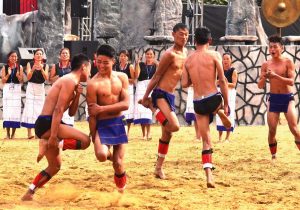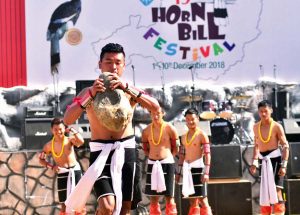Nagaland
Day-six Hornbill throws in heady mix of tradition, games and skill

Dimapur, Dec. 6 (EMN): The rush of cultural exchange at the Hornbill Festival gathered momentum on Dec. 6 at Kisama village, in Kohima district. The Thursday programme, the sixth of the ten-day event, saw the governor of Mizoram Kummanam Rajasekhar attending as the chief guest while the special guest was Major General VK Mishra, updates from the DIPR informed on Thursday.
Governor Rajasekhar addressed the gathering. He expressed happiness to be a part of one of the biggest cultural extravaganzas in the Northeast.
‘The mission of the festival is to revive, protect, sustain and protect the richness of the Naga heritage and the traditional is clearly being seen here,’ he stated. The colourful display of ethnic dance, sports and music from various ethnic tribes is a once-in-a-lifetime experience, he said. The governor said that the cultural dances, indigenous sports and folk songs were a rich medium that promotes the culture of Nagaland to other parts of the country.
The cultural program of the day began with a Sumi cultural troupe playing Akhetsu Kukakeu (top spinning). This is an indigenous game played by the Sumi community. Each player takes turns to

spin the top and vie to achieve the longest spin, besides trying to strike their opponent’s spinning top. The one who manages to spin the tip for the longest time becomes the winner.
A folk song called Wochak Khundung was sung by members of the Yimchunger tribe. The song is sung by the groups of workers in rhythm as they work and weed the fields.
Likewise, the ‘Awaina Lim amur falcon dance’ by the Zeliang tribe was another highlight; it depicts the happy, merry making movement of the falcons. Also, members of a Rengma cultural troupe sang a tribal lullaby Nyuhonyu Kehulu.
The Angami cultural troupe also presented that Neiyie Tsupre (test of strength and maturity). In this game each youth attempts to carry a stone held up above the head, from the hearth. They are not allowed to touch the body. They then walk around the yard to show their strength and eligibility for marriage. Failure while attempting this was interpreted as a sign of immaturity.
Furu Thsuh Khisong, a song sung when pounding paddy or rice was sung by a Sangtam cultural troupe.
Further, a Pochury cultural troupe played an indigenous game called Adoubvu Akhanyo. The game consists of two groups. Players tie shawls around their waist and try to pull each other down. Great physical strength and stamina are required to play this sport.
Later, a Kachari cultural troupe performed a dance called Baikhon/BaiJubu. This dance can be performed by both men and women of all age groups. The dance movement imitates the crawling of a python, the DIPR stated in its updates.
Members of the Lotha community competed in Ejupta (cock fight). It is an indigenous game played on community occasions by the Naga tribes. In this game, each of the competitors hold one leg, and hop to try to shoulder out their opponents from a given area or dislodge them. In olden days the cock fight was fought by categories of age.

Afternoon session of cultural programme
Air Marshal Raghunath Nambir, AOC-in-Chief of Eastern Air Command; and S Snehalatha, principal accountant general, of Telengana were the guests of honour for the afternoon session of the cultural programme at Kisama village.
Various cultural groups representing various tribal communities such as the Kuki, Phom, Chang; Garo Chakhesang, and the Ao performed during the afternoon session of the festivities.

